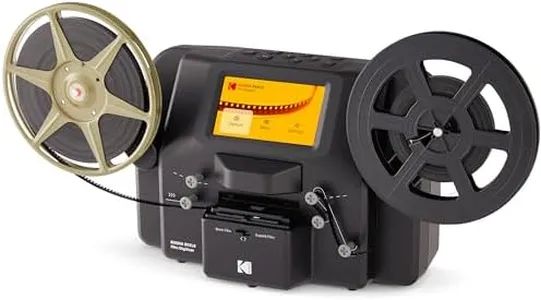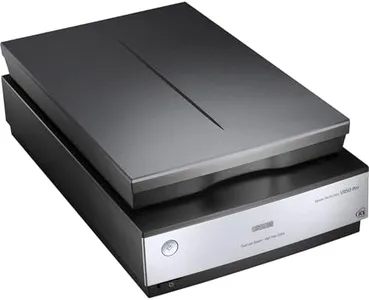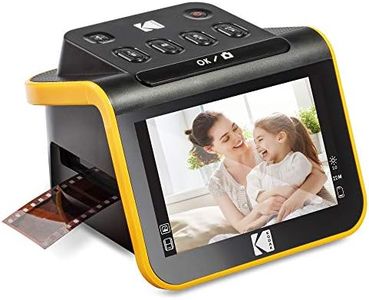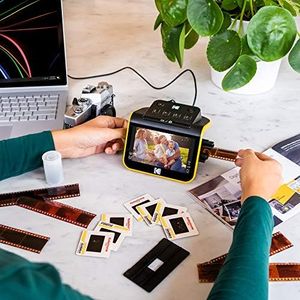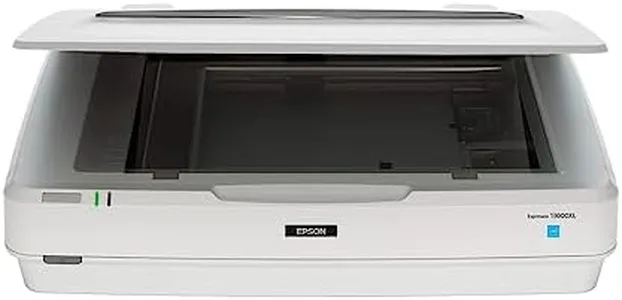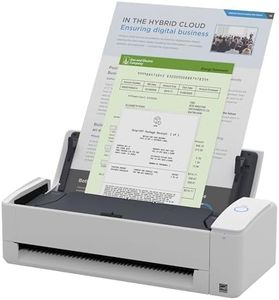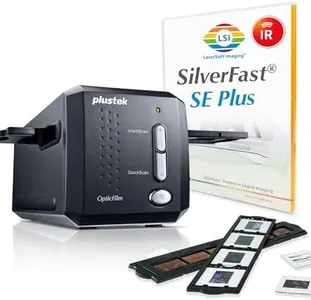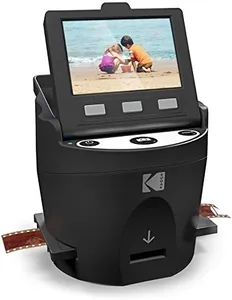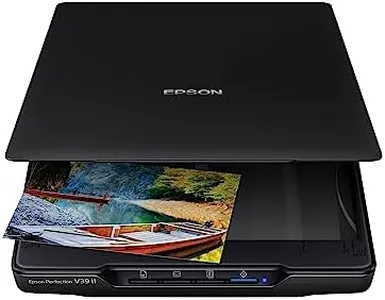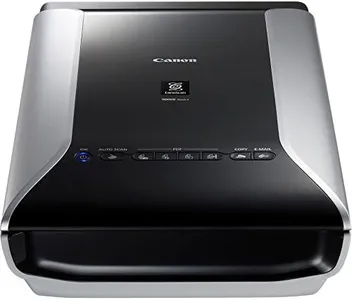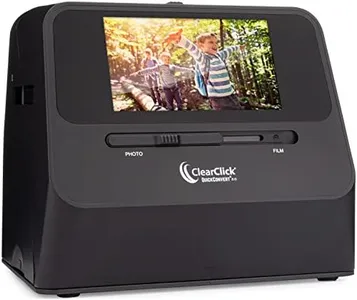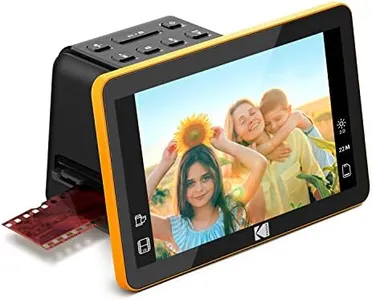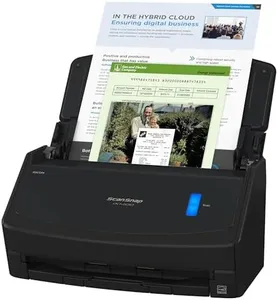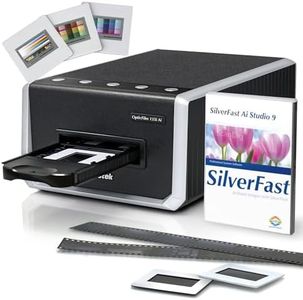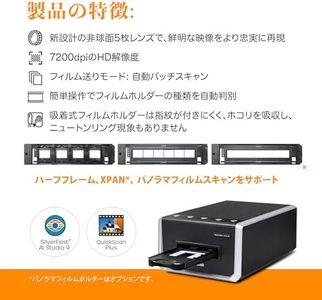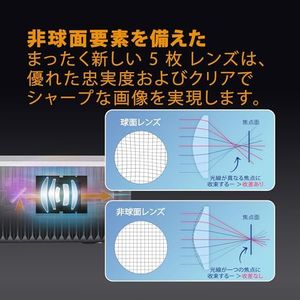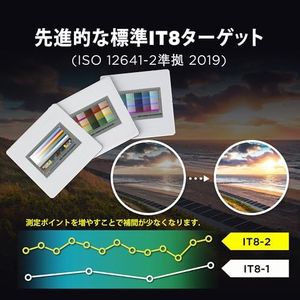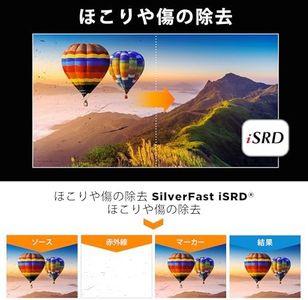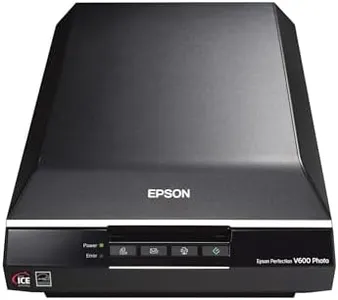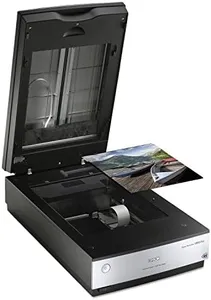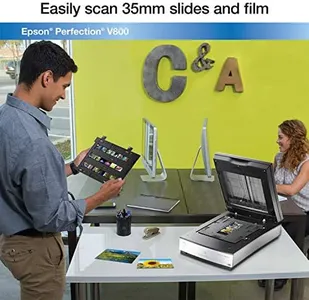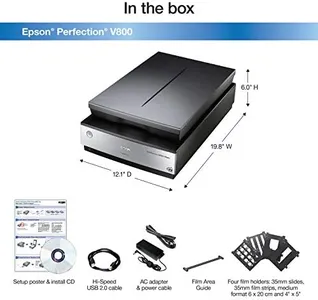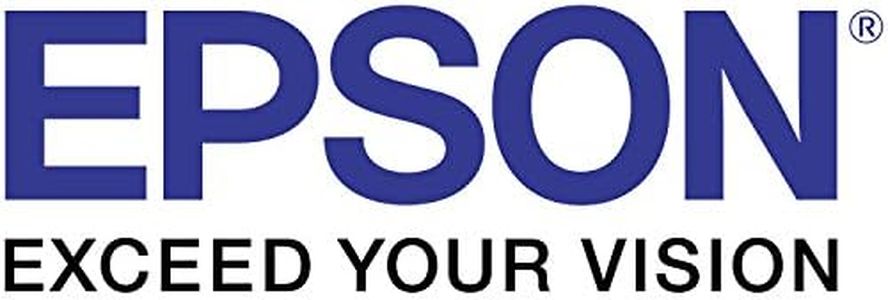10 Best Photo Film Scanner 2025 in the United States
Winner
KODAK REELS 8mm & Super 8 Films Digitizer Converter with Big 5” Screen, Scanner Converts Film Frame by Frame to Digital MP4 Files for Viewing, Sharing & Saving on SD Card for 3” 4” 5” 7” and 9” Reels
KODAK REELS 8mm & Super 8 Films Digitizer Converter with Big 5” Screen, Scanner Converts Film Frame by Frame to Digital MP4 Files for Viewing, Sharing & Saving on SD Card for 3” 4” 5” 7” and 9” Reels
Chosen by 1159 this week
Epson Perfection V850 Pro scanner
Epson Perfection V850 Pro scanner
KODAK Slide N SCAN Film & Slide Scanner Digitizer with 5” LCD Screen, Quickly Convert Negatives & Slides to Digital 22MP JPEG Photos, Compatible with 135, 126 and 110 Film & Slides
KODAK Slide N SCAN Film & Slide Scanner Digitizer with 5” LCD Screen, Quickly Convert Negatives & Slides to Digital 22MP JPEG Photos, Compatible with 135, 126 and 110 Film & Slides
Epson Expression 13000XL Archival Photo and Graphics Flatbed Scanner
Epson Expression 13000XL Archival Photo and Graphics Flatbed Scanner
ScanSnap iX1300 Compact Wireless or USB Double-Sided Color Document, Photo & Receipt Scanner with Auto Document Feeder and Manual Feeder for Mac or PC, White
ScanSnap iX1300 Compact Wireless or USB Double-Sided Color Document, Photo & Receipt Scanner with Auto Document Feeder and Manual Feeder for Mac or PC, White
ScanSnap iX1400 High-Speed Simple One-Touch Button Color Document, Photo & Receipt Scanner with Auto Document Feeder for Mac or PC, Black
ScanSnap iX1400 High-Speed Simple One-Touch Button Color Document, Photo & Receipt Scanner with Auto Document Feeder for Mac or PC, Black
Epson Perfection V600 Color Photo, Image, Film, Negative & Document Scanner
Epson Perfection V600 Color Photo, Image, Film, Negative & Document Scanner
Epson Perfection V800 Photo scanner
Epson Perfection V800 Photo scanner
Our technology thoroughly searches through the online shopping world, reviewing hundreds of sites. We then process and analyze this information, updating in real-time to bring you the latest top-rated products. This way, you always get the best and most current options available.

Our Top Picks
Winner
KODAK REELS 8mm & Super 8 Films Digitizer Converter with Big 5” Screen, Scanner Converts Film Frame by Frame to Digital MP4 Files for Viewing, Sharing & Saving on SD Card for 3” 4” 5” 7” and 9” Reels
Most important from
698 reviews
The KODAK REELS 8mm & Super 8 Films Digitizer Converter stands out for converting old 8mm and Super 8mm films into digital MP4 files, making vintage memories easily accessible and shareable. Its 8.08-megapixel sensor delivers clear and detailed 1080p video files, though it's worth noting that the device does not capture sound. The large 5-inch LCD screen with touch buttons simplifies the process of recording, converting, and playback, making it user-friendly even for those not tech-savvy.
The device's compact nature (12.4” x 8.4” x 6.1”) and lightweight design (5.83 pounds) add to its portability, making it convenient for travel and storage. The package includes essential accessories such as a 7-inch empty film reel, adapters, and various cables, which enhances its value. The digitizer is compatible with Windows 7 and above, but the SD card for storage is not included.
A significant advantage is the lack of need for a computer or additional software during the digitizing process, simplifying the user experience. However, some users might miss advanced editing features, and the absence of sound capture could be a drawback for films where audio is integral. Despite these minor limitations, it is a thoughtful gift option for home movie enthusiasts or anyone looking to preserve family memories.
Most important from
698 reviews
Epson Perfection V850 Pro scanner
Most important from
476 reviews
The Epson Perfection V850 Pro is an excellent choice for photography enthusiasts and professionals looking to digitize film and photos with outstanding quality. With a remarkable resolution of 6400 dpi and capabilities reaching up to 9600 dpi, it ensures that every detail is captured crisply, making it a standout in the photo film scanner category. Its unique dual lens system allows users to select the best lens for their needs, optimizing the results based on the type of media being scanned. This feature is particularly beneficial when working with various film formats or high-resolution photos, as it enhances tonal range thanks to its impressive 4.0 Dmax, providing smooth gradations and detailed shadows.
There are a few downsides to consider. The scanner is relatively heavy at 20.9 pounds, which may pose challenges for users who require portability or have limited space. Additionally, its size (12.1 x 19.8 x 6 inches) may not be convenient for everyone, and it requires a dedicated workspace. Connectivity is limited to USB, which might be a drawback for those looking for wireless options.
Compatibility is a strong point, as it works with a wide range of Windows and Mac operating systems, making it accessible to many users. The software included is user-friendly, but advanced features may have a learning curve for beginners in photo editing.
Most important from
476 reviews
KODAK Slide N SCAN Film & Slide Scanner Digitizer with 5” LCD Screen, Quickly Convert Negatives & Slides to Digital 22MP JPEG Photos, Compatible with 135, 126 and 110 Film & Slides
Most important from
11428 reviews
The Kodak Digital Film Scanner is an excellent option for anyone looking to convert old photo films and slides into high-resolution digital images. With a resolution of 22MP, it ensures that your scanned photos are clear and detailed. The 5-inch LCD screen is a standout feature, offering a large, easy-to-view display for previewing and editing images. This makes it user-friendly, even for those who might not be tech-savvy.
The scanner handles various film types, including 35mm, 126, and 110, adding to its versatility. It connects via USB and HDMI, making it compatible with many modern devices, and supports SD/SDHC cards up to 32GB for easy storage of your scanned images (though the card is not included). One of the significant advantages of this scanner is its quick-feeding tray technology, which simplifies the loading process and speeds up scanning.
The built-in editing features allow for basic adjustments like color, brightness, and date/time settings with just a single touch, making it very convenient for users. The compact size and lightweight design make it highly portable, though the need for an external SD card can be seen as an inconvenience. The Kodak Digital Film Scanner is a solid choice for those looking to digitize their old photo memories with ease, offering a good blend of features and user-friendly operation.
